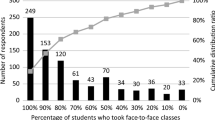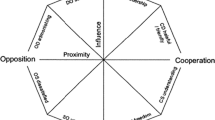Abstract
Contributed data reflective of students’ compliance in doing electronic homework (e-HW) exercises when asked to choose when required e-HW assignments are due are evaluated using a quasi-experimental format with non-equivalent groups to determine if first-semester general chemistry (Chem I) students (N = 273) will academically benefit from improved e-HW completion rates. The three groups studied are categorized under their VOICES (Voluntary Options in Chemical Education Schedules). Evaluated for each VOICES group are (1) results of students’ procedural arithmetic ability without the use of a calculating device as determined by their scores on the MUST (Math-Up Skills Test) and (2) outcomes of e-HW due-date compliance and achievement compared to final course averages. Students who entered with below average MUST scores were the least successful course completers (increased percentage of D/F grades) as compared to those in the average or above average MUST score ranges. Students who followed the instructor’s predetermined schedule (VOICES 1) outperformed the other groups of students who chose due dates based on personal preferences. A higher percentage of VOICES 1 achieved e-HW mastery level of 89.5% than VOICES 2 (individual choice of e-HW due dates) and VOICES 3 (e-HW due at end of semester). Students who selected their own e-HW due dates entered with less automaticity ability and completed the course with lower averages, but without statistical difference. Students regardless of the VOICES group who completed at least 69.5% of their e-HW showed greater course success (i.e., grades of A, B, or C) than those who did not.


Similar content being viewed by others
Data Availability
Deidentified student data are available from the corresponding author upon written request.
References
Albaladejo, J. D. P., Broadway, S., Mamiya, B., Petros, A., Powell, C. B., Shelton, G. R., Walker, D. R., Weber, R., Williamson, V. M., & Mason, D. (2018). Conf Chem Conference on Mathematics in Undergraduate Chemistry Instruction: MUST-Know Pilot Study—Math Preparation Study from Texas. Journal of Chemical Education, 95(8), 1428–1429. https://doi.org/10.1021/acs.jchemed.8b00096
Alivio, T. E. G., Howard, E. H., Mamiya, B., & Williamson, V. M. (2020). How does a math review impact a student’s arithmetic skills and performance in first-semester general chemistry? Journal of Science Education and Technology, 29(6), 703–712. https://doi.org/10.1007/s10956-020-09851-7
Ames, C., & Ames, R. (1989). Research in motivation in education (Vol. 3). Academic Press.
Atkinson, J., & Raynor, O. (1974). Motivation and achievement. Washington: Winston.
Blanc, R. A., DeBuhr, L. E., & Martin, D. C. (1983). Breaking the attrition cycle: The effects of Supplemental Instruction on undergraduate performance and attrition. Journal of Higher Education, 54(1), 80–90. https://doi.org/10.1080/00221546.1983.11778153
Bodenstedt, K., Dubrovskiy, A., Lee, K., Rix, B., & Mason, D. (2022). Impact of Students’ Automaticity Ability on their Success in O-Chem I. Biomedical Journal of Scientific & Technical Research, 42(1). https://doi.org/10.26717/BJSTR.2022.42.006700, https://biomedres.us/pdfs/BJSTR.MS.ID.006700.pdf
Brooks, D. W., & Shell, D. F. (2006). Working memory, motivation, and teacher-initiated learning. Journal of Science Education and Technology, 15(1), 17–30.
Cosio, M. N., & Williamson, V. M. (2019). Timing of homework completion vs. performance in general chemistry. Journal of Science Education and Technology, 28(5), 523–531.
Dubrovskiy, A., Broadway, S., Jang, B., Mamiya, B., Powell, C. B., Shelton, G. R., Walker, D. R., Weber, R., Williamson, V., Villalta-Cerdas, A., & Mason, D. (2022). Is the gender gap closing? Journal of Research in Science Mathematics and Technology Education, 5(1), 37–57. https://doi.org/10.31756/jrsmte.512
Ericsson, K. A. (1996). The acquisition of expert performance: an introduction to some of the issues. The Road to Excellence (pp. 1–50). Psychology Press.
Ericsson, K. A. (2006). The influence of experience and deliberate practice on the development of superior expert performance. The Cambridge Handbook of Expertise and Expert Performance, 38(685–705), 2–2.
Ericsson, K. A., Chase, W. G., & Faloon, S. (1980). Acquisition of a memory skill. Science, 208(4448), 1181–1182. https://doi.org/10.1126/science.7375930
Ericsson, K. A., Krampe, R. T., & Tesch-Römer, C. (1993). The role of deliberate practice in the acquisition of expert performance. Psychological Review, 100(3), 363.
Glasser, W. (1997). A new look at school failure and school success. Phi Delta Kappan, 78(8), 596.
Glick, D. M., & Semb, G. B. (1978). Instructor-set pacing contingencies versus the absence of such contingencies in a personalized university course. Journal of Personalized Instruction, 3, 131–137.
Hartman, J. A. R., & Nelson, E. A. (2016). Automaticity in computation and student success in introductory physical science courses. Cornell University Library. Retrieved May 14, 2022, from arXiv:1608.05006v2 [physics.ed-ph] Paper presented as part of Chemistry & Cognition: Support for Cognitive-Based First-Year Chemistry, 2016. Link to quiz: http://bit.ly/1HyamPc
Hartman, J. R., Nelson, E. A., & Kirschner, P. A. (2022). Improving student success in chemistry through cognitive science. Foundations of Chemistry. https://doi.org/10.1007/s10698-022-09427-w
Johnstone, A. H. (1991). Why is science difficult to learn? Things are seldom what they seem. Journal of Computer Assisted Learning, 7(2), 75–83. https://doi.org/10.1111/j.1365-2729.1991.tb00230.x
Keller, F. S. (1967). Engineering personalized instruction in the classroom. Journal of Psychology, 1(3). https://journal.sipsych.org/index.php/IJP/article/view/445
Lee, K. S., Rix, B., & Spivey, M. Z. (2023). Predictions of Success in Organic Chemistry Based on a Mathematics Skills Test and Academic Achievement. Chemistry Education Research and Practice. https://doi.org/10.1039/D2RP00140C
Mamiya, B., Powell, C. B., Shelton, G. R., Dubrovskiy, A., Villalta-Cerdas, A., Broadway, S., Weber, R., & Mason, D. (2022). Influence of Environmental Factors on Success of At-Risk Hispanic Students in First-Semester General Chemistry. Journal of College Science Teaching, 51(4), 46–57.
Petros, A., Weber, R., Broadway, S., Ford, R., Powell, C., Hunter, K., Williamson, V., Walker, D., Mamiya, B., Del Pilar, J., Shelton, G. R., & Mason, D. (2017). 4 MUST-Know Pilot—Math Preparation Study from Texas. ACS DivCHED CCCE (Committee on Computers in Chemical Education) online conference organized by Cary Kilner and Eric Nelson. Retrieved May 14, 2022, from https://confchem.ccce.divched.org/content/2017fallconfchemp2
Powell, C. B., Pamplin, K. L., Blake, R. E., & Mason, D. S. (2010). Summer professional development in chemistry for inservice teachers using OWL Quick Prep. Journal of Science Education Technology, 19, 126–132. https://doi.org/10.1007/s10956-009-9186-y
Powell, C. B., Simpson, J., Williamson, V. M., Dubrovskiy, A., Walker, D. R., Jang, B., Shelton, G. R., & Mason, D. (2020). Impact of arithmetic automaticity on students' success in second-semester general chemistry. Chemistry Education Research and Practice, 21, 1028–1041. https://doi.org/10.1039/D0RP00006J
Semb, G. B., Conyers, D., Spencer, R., & Sanchez-Sosa, J. J. (1975). An experimental comparison of four pacing contingencies. In J. M. Johnston (Ed)., Behavior Research and Technology in Higher Education (pp. 348–368). Springfield, IL: Thomas.
Shell D. F., Brooks D. W., Trainin G., Wilson K. M., Kauffman D. F., & Herr, L. M. (2010). The unified learning model, Dordrecht, Netherlands: Springer.
Shelton, G. R., Mamiya, B., Walker, D. R., Weber, R., Powell, C. A., Villalta-Cerdas, A., Dubrovskiy, A. V., Jang, B., & Mason, D. (2021). Early Warning Signals from Automaticity Diagnostic Instruments for First- and Second-Semester General Chemistry. Journal of Chemical Education, 98, 3061–3072. https://doi.org/10.1021/acs.jchemed.1c00714
Tomlinson, C. A. (2000). Reconcilable differences? Standards-based teaching and differentiation. Educational Leadership, 58(1), 6–11. https://www.scinapse.io/papers/1559308842
Villalta-Cerdas, A., Dubrovskiy, A., Mamiya, B., Walker, D. R., Powell, C. B., Broadway, S., Weber, R., Shelton, G. R., & Mason, D. (2022). Personal characteristics influencing college readiness of Hispanic students in a STEM gateway course: first-semester general chemistry. Journal of College Science Teaching, 51(5), 31–41.
Vygotsky, L. S., & Cole, M. (1978). Mind in society: development of higher psychological processes. Harvard university press.
Williamson, V. M., Walker, D. R., Chuu, E., Broadway, S., Mamiya, B., Powell, C. M., Shelton, G. R., Weber, R., Dabney, A. R., & Mason, D. (2020). Impact of basic arithmetic skills on success in first-semester general chemistry. Chemistry Education Research and Practice, 21, 51–61. https://doi.org/10.1039/C9RP00077A
Weber, R., Powell, C. B., Williamson, V., Mamiya, B., Walker, D. R., Dubrovskiy, A., Shelton, G. R., Villalta-Cerdas, A., Jang, B., Broadway, S., & Mason, D. (2020). Relationship between academic preparation in general chemistry and potential careers. Biomedical Journal of Scientific & Technical Research, 32(5), 25,311–25,323. https://doi.org/10.26717/BJSTR.2020.32.005312
Willis, W. K., Williamson, V. M., Chuu, E., & Dabney, A. R. (2022). The relationship between a student’s success in first-semester general chemistry and their mathematics fluency, profile, and performance on common questions. Journal of Science Education and Technology, 31, 1–15.
Acknowledgements
The authors appreciate and thank Dr. Ellen Verdel for her review effort and suggestions to improve this manuscript.
Author information
Authors and Affiliations
Corresponding author
Ethics declarations
Ethical Approval
All procedures performed in these studies involving human participants were in accordance with the ethical standards of the institutional and/or national research committee and with the 1964 Helsinki Declaration and its later amendments or comparable ethical standards. The research used large-scale secondary datasets. No data are traceable to individual participants.
Informed Consent
Informed consent was obtained from all individual participants included in the study.
Conflict of Interest
The authors declare no competing interests.
Additional information
Publisher's Note
Springer Nature remains neutral with regard to jurisdictional claims in published maps and institutional affiliations.
Rights and permissions
Springer Nature or its licensor (e.g. a society or other partner) holds exclusive rights to this article under a publishing agreement with the author(s) or other rightsholder(s); author self-archiving of the accepted manuscript version of this article is solely governed by the terms of such publishing agreement and applicable law.
About this article
Cite this article
Ford, R., Broadway, S. & Mason, D. e-Homework and Motivation for Students’ Success in First-Semester General Chemistry. J Sci Educ Technol 32, 433–443 (2023). https://doi.org/10.1007/s10956-023-10036-1
Accepted:
Published:
Issue Date:
DOI: https://doi.org/10.1007/s10956-023-10036-1




